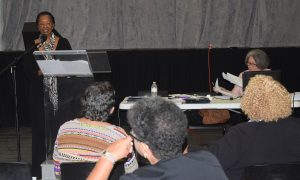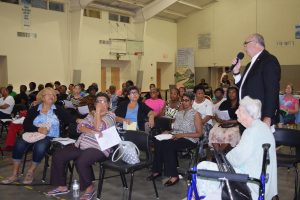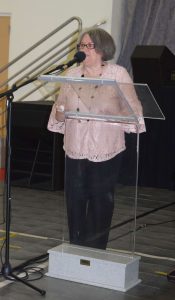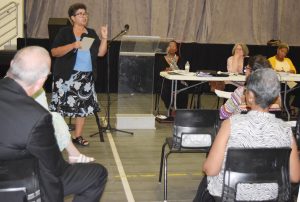Older Persons GT gathering
 Cayman Islands Council for Older Persons Holds George Town Gathering
Cayman Islands Council for Older Persons Holds George Town Gathering
● Government Ministers, Community Affairs Chief Officer and Deputy attended the gathering
● Council asked senior citizens to complete and return register forms
● Consultation meeting generated many questions and comments by attendees
GRAND CAYMAN (GIS) – Rain did little to dampen the spirits of attendees at the Council for Older Persons district gathering in George Town recently.
The penultimate in a series of six district consultations, the evening meeting featured presentations from the Council on its mandate, and sought public input on how the body can best serve senior citizens in the Cayman Islands.
Financial Services Minister, Hon. Roy McTaggart and Minister of Commerce, Planning and Infrastructure, Hon. Joey Hew attended. The Ministry of Community Affairs Chief Officer, Teresa Echenique, and Deputy Chief Officer Andre Ebanks were also present.
The Council’s Chairperson and district representative [Lucille Seymour] gave a short presentation and introduced fellow panelists: Deputy Chairperson Alice Mae Coe and Ministry of Community Affairs Policy Officer (Gender Affairs) Karlene Bramwell.
Ms Lucille outlined the aims and purpose of the Older Persons Law, 2017; the Cayman Islands Older Persons Policy, 2016-2035 (both available online on Cayman Islands Government Cabinet Office website under “Publications”) and the Council for Older Persons. She then invited attendees to voice their opinions, so the Council can advocate on their behalf.
Minister McTaggart gave remarks in the absence of the Premier, and Minister for Community Affairs, Hon. Alden McLaughlin. He advised that the Council, convened in November 2017, is working diligently to “champion and monitor the promotion and development of programmes, projects and legislative measures while ensuring that the Cayman Islands Older Policy is adhered to.”
“As Minister of Finance and Economic Development, I work with all ministries to ensure that we meet the commitments we make to the people, including our elders,” he said. “Some of these include healthcare, continuing education, poor relief, pensions and general safety.”
Minister Hew shared his interest in championing the welfare of elders and pledged to ensure the support of his Ministry. “We must take every opportunity we can to include our older persons in all aspects of civic life,” he remarked. “Without your past and continuing contributions we will lose our connection to our heritage, our culture and our sense of who we are.”
The Council’s Deputy Chairperson, Alice Mae Coe, said that the law, the Council and the Policy, go hand-in-hand towards enabling a mechanism to promote older persons’ access to vital services. All three sought to advance: the affordability of services; physical accessibility and adequate maintenance; as well as championing the full inclusion of seniors in the cultural and economic life of the Cayman Islands.
Ms Bramwell outlined the policy’s five major goals and the action strategies the Council can use to achieve them. The Council member emphasised that several ministries are responsible for action steps which require private sector involvement.
She said that many of the action steps focus on the full inclusion of the elderly, and include recognising their healthcare needs; their role as residents; their value within families and their potential contributions in strengthening inter-generational relationships.
The policy officer acknowledged that some services needed by the elderly are partially provided by the Department of Children and Family Services, through their residential facilities and community development officers. She added that some churches, charities and non-governmental agencies are also helping with such provision.
She also informed attendees that the Health Insurance Commission had launched a feasibility study on healthcare insurance plan provision for elders, a task which coincides with goal three of the Older Persons Policy.
In addition, participants received copies of the older persons’ registration forms. Ms Lucille explained that while the skills and information forms are mandated by the Law, seniors are requested but not obliged to complete and return them to the Council.
The Chairperson outlined the various ways such information will be an invaluable resource. As an example of the potential benefits to older persons, she advised that the data can assist with hurricane preparedness objectives and help set-up a skills inventory for those wanting work.
Questions and comments followed. These included the perceived need for dedicated facilities for senior citizens to meet and socialise to stave off loneliness; and the need to support for adults who act as carers for their parents or grandparents.
Former George Town Primary Principal, Marie Martin, suggested setting up intergenerational programmes. She said that these will lead to increased opportunities for contact between senior citizens and younger persons.
Other proposals included further subsidising healthcare for the elderly, establishing a seniors’ discount card, and increasing opportunities for seniors to pass on local history to students.
One attendee suggested providing transportation from hospitals and another asked that churches be encouraged to offer halls as meeting places and their mini vans for transportation. Former Social Services Director Deanna Look Loy asked for the Council to review former senior citizens programmes which had been popular.
The Council’s Chairperson welcomed the range and quality of proposals and recommendations put forward. Ms Lucille promised to take the feedback from all the gatherings to full meetings of the Council for members to systematically review and decide on what action to take.









